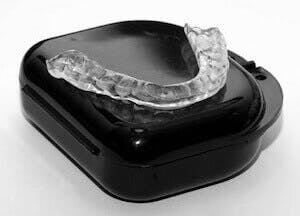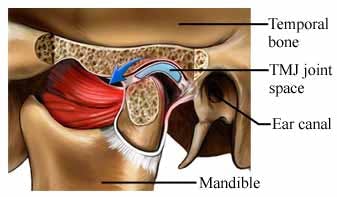TMD/Bruxism Night guards North York
Grinding and Clenching - Nightguards
Grinding and Clenching – Nightguards in North York
Tooth grinding causes many dental problems if you’re part of the 25 percent of the population that experiences it. Most people with bruxism (grinding and clenching) don’t exhibit any immediate symptoms but show wear on their teeth and gum line that indicates the problem. Only 5 percent display painful symptoms, which vary from extreme headaches to ear, tooth or jaw pain. North York family dentist Dr. Nubia Diaz recommends wearing a nightguard to prevent further deterioration of teeth, gums and the jawbones if grindning or clenching is occuring.

Identification of problems:
- If you grind your teeth in the night, you may wake up with painful teeth or jaws. If there is no pain to alert you, your spouse may tell you that you grind because the noise keeps her awake or your dentist may notice signs during a dental exam. Dentists don’t agree on the origination of bruxism. Various theories link it to emotional stress, misalignment of the jaw, genetics, allergies or intake of caffeine, tobacco or amphetamines. Night guards prevent much of the pressure on the teeth.
- Watch out for further damage. Tooth grinding often occurs in children. Sometimes bruxism goes away by the time children reach the age of 10, other times it becomes worse. The alignment of the permanent teeth dictates the difference. Those with serious malocclusion seem to be candidates for the problem. This occurs most of the time at night because it’s a subconscious neuromuscular disorder. Braces often prevent tooth grinding later in life.
- Keep the Temporomandibular Joint (or TMJ joint) in neutral position with a night guard fitted to your mouth. Night guards that are custom fit by dentists leave the temporomandibular joint in neutral position. The guard trains the joint to relax and relieves a lot of the pressure

Dr. Nubia Diaz can provide relief for patients who grind or clench their teeth through fabrication of a nightguard. These guards are usually worn at night while sleeping, but some patients may need to wear them during the day. They are made of either a hard or soft material. Toronto dentist Dr. Nubia Diaz will determine the type of guard needed by the wear on the teeth and by the health of the TMJ. Call for an appointment (416)636-4227.
Bruxism is a condition in which you grind or clench your teeth. If you have bruxism, you may unconsciously clench your teeth when you're awake, or clench or grind them during sleep. Mild bruxism may not require treatment. However, for some people, bruxism can be frequent and severe enough to lead to jaw disorders, headaches, damaged teeth and other problems.
Signs and Symptoms of Bruxism
- Teeth grinding or clenching, which may be loud enough to wake up your sleep partner
- Teeth that are flattened, fractured, chipped or loose
- Worn tooth enamel, exposing deeper layers of your tooth
- Increased tooth pain or sensitivity
- Damage from chewing on the inside of your cheek
- Jaw, neck or face pain or soreness
It's important to talk to your dentist if you feel you are experiencing any of these bruxism symptoms. Regular dental checkups can also reveal problems with your teeth if you regularly grind or clench them. Your dentist can recommend a mouthguard so you don't damage your teeth.
TMD stands for Temporomandibular Joint Disorder, and typically this disorder presents in pain in the areas of the joints holding the upper and lower jaw together, which may result in difficulty for the patient in moving the jaw.
Signs or symptoms of TMD include pain and tenderness in or around the ear, the jaw or the muscles face or temples. Other symptoms are problems opening or closing your mouth, and a clicking, popping, crunching or grinding noise when you chew, yawn or open your mouth. TMD may be linked with neck pain and headaches. In most cases, TMD are caused by a combination of factors like jaw injuries and joint disease, such as arthritis. It is believed that bruxism and head or neck muscle tension may make TMD symptoms worse. Stress is also a possible factor.
How can your dentist help with TMD
To properly diagnose TMD, your dentist will conduct a thorough medical and dental evaluation and may take certain X-rays (panoramic) to evaluate the jaw joint and surrounding structures and check your occlusion. He may check the muscles and tissues of the head and neck to test for inflammation. Certain exercises and movements may be involved, and you may get a referral to an oral and maxillofacial surgeon for further evaluation and diagnosis.
Stonebrook Dental in North York provides professional, custom dental nightguards to treat both bruxism and TMD disorders; contact us to schedule a consultation appointment.
Book Online
Stonebrook Dental offers the ability to request your dentist appointments online. Schedule an appointment now!
Book OnlineNew Patient Forms
By filling out the New Patient Forms ahead of time you will save significant time on your visit.
New Patient Forms